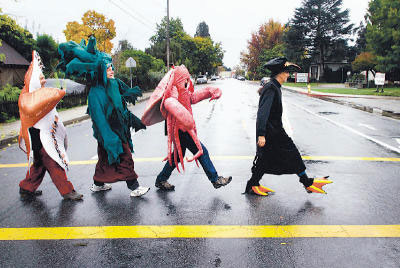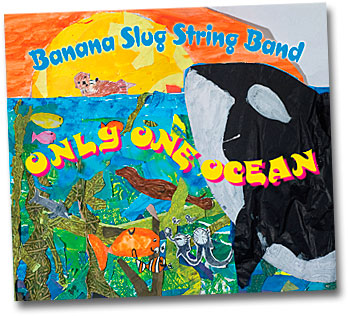 From the songs of humpback whales in the open sea, to the rhythm of waves against the shore, the ocean is full of music. Now, an award-winning music CD—created by musicians, scientists and educators—is inspiring and teaching kids about the science of the ocean.
From the songs of humpback whales in the open sea, to the rhythm of waves against the shore, the ocean is full of music. Now, an award-winning music CD—created by musicians, scientists and educators—is inspiring and teaching kids about the science of the ocean.
Only One Ocean, with 14 rockin’, fact-filled songs, is a first-of-its-kind ocean literacy project, written and recorded by the popular Banana Slug String Band (seen here crossing "Crabby Road"). The entire CD was supported and reviewed for content by scientists and educators from the National Oceanic and Atmospheric Administration (NOAA), National Marine Educators Association (NMEA), Centers for Ocean Sciences Excellence (COSEE), and Marine Activities, Resources and Education (MARE) program at UC Berkeley’s Lawrence Hall of Science.
“We’re welcoming kids into a realm that’s both musical and scientific,” says musician and band co-director Doug “Dirt” Greenfield. The band spent more than two years creating the Only One Ocean CD, working with scientists from many specialties including marine biology, oceanography, geology and climatology.
Set to rock, folk, reggae, rap and other musical styles, the CD celebrates ocean organisms in songs like “Jellies Ballet” and “Kingdom of the Crab,” and introduces the seven principles of ocean literacy, with one song for each principle. The CD title and title song were inspired by principle #1: The Earth has one big ocean with many features.
“Ocean literacy means understanding the influence the ocean has on you and you have on the ocean,” says Craig Strang, Lawrence Hall of Science associate director and a leader in the Ocean Literacy Campaign, who conceived the CD project with the band. He believes merging science and art is a very compelling type of collaboration to get the ocean message out. “I was a little nervous going in,” he recalls, ”but the band took it as a challenge to get the science right and still make great music!"
The songs aren’t designed just for listening but for creative participation as well. For example, at the end of the song “Ocean Flow,” the band laid down an instrumental-only track, so kids could make up their own verses and sing along.
 The CD has won a Parents’ Choice Award, and great reviews are coming in from all kinds of educators, including music teachers who have kids singing the songs as part of their classroom arts curriculum, and at school concerts and theatrical performances. The Banana Slug String Band is all for the songs being performed live, since the band has been teaching about the environment through high-energy, live concerts, with lots of audience participation, for more than 25 years.
The CD has won a Parents’ Choice Award, and great reviews are coming in from all kinds of educators, including music teachers who have kids singing the songs as part of their classroom arts curriculum, and at school concerts and theatrical performances. The Banana Slug String Band is all for the songs being performed live, since the band has been teaching about the environment through high-energy, live concerts, with lots of audience participation, for more than 25 years.
One particular audience for the new songs still came as a surprise to the musicians. “We were playing the song about whales, called ‘Cetacea’, on a whale watching trip in Hawaii with the Pacific Whale Foundation,” Greenfield recalls. “As we were playing, the humpbacks we’d been watching from a distance came right up to our boat. One baby whale sort of rolled on its back and started making rhythmic movements—it looked like it was dancing with the music!”
With the full CD and individual songs widely available for download, the musicians and scientists behind Only One Ocean hope its musical/scientific message will reach listeners in all kinds of geographic areas, even kids who have never seen or touched the ocean.
“A song can set the stage for learning in a very personal sense,” says “Solar” Steve Van Zandt, who wrote all the songs on the CD. “We’re sparking a sense of wonder, which is the basis of the inquiry method of science learning.”
“First we want kids to be amazed at the ocean,” adds Greenfield. From amazement, he says, can come scientific understanding of ocean processes, curiosity to learn more about incredible organisms, and concern about how to protect the ocean which is so critical to all life on Earth. In the meantime, learners of any age can rock along with the music just for the sheer joy of it. After all, observes Greenfield, who says saving the planet can’t be fun?
